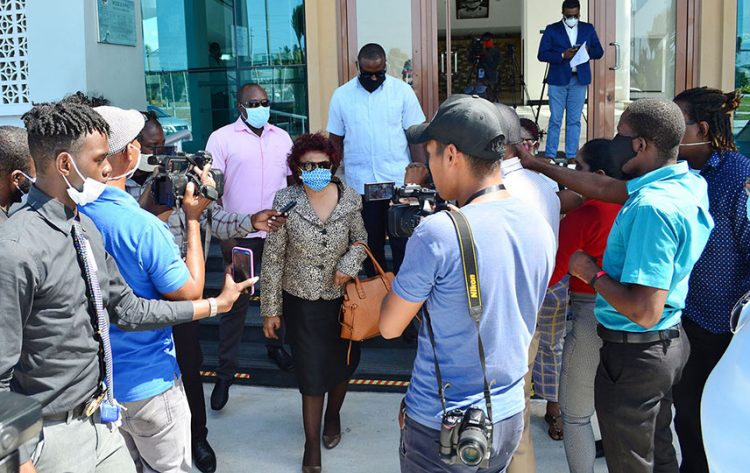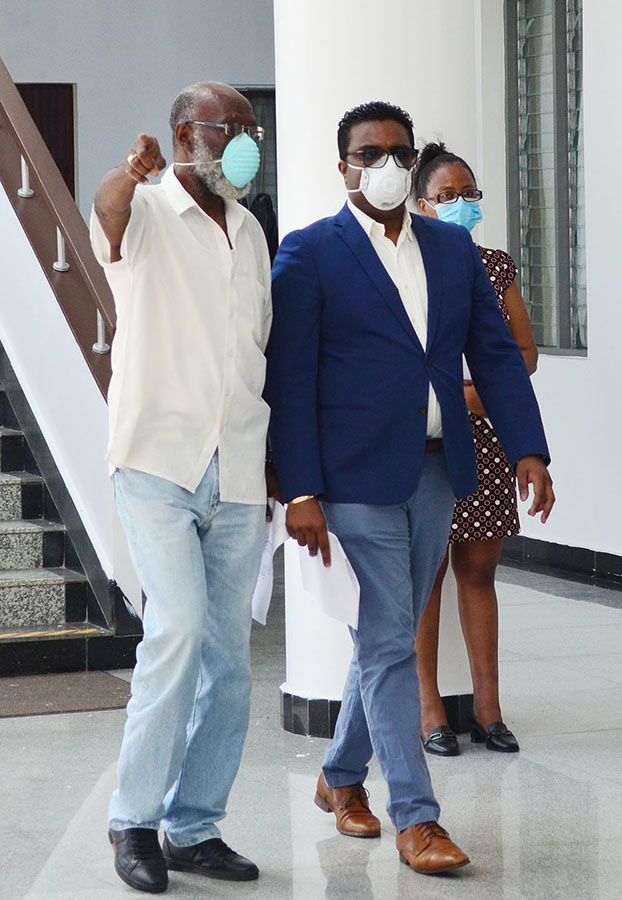GECOM is today expected to make a long-awaited final decision on a plan for the recount of votes at the March 2nd elections.
A visit to the Arthur Chung Convention Centre (ACCC), the site for a national recount and another statutory meeting ended yesterday without a decision being made by the Guyana Elections Commission (GECOM) as it is yet to decide on the number of work stations to be set up for the process.
The drawn-out deliberations more than six weeks after the election continue even as international calls grow for a swift recount. (See other story on page 11.)

In his much-criticised draft operational plan, Chief Election Officer (CEO) Keith Lowenfield had initially proposed 156 days to carry out the recount and for counting to be done at three workstations, with two hours to count each of the 2,339 ballot boxes.
However, after questions were raised about the number of days, Lowenfield proposed an extension of five work stations instead but did not specify a time for the exercise to be completed.
People’s Progressive Party/Civic (PPP/C)-appointed GECOM commissioner, Sase Gunraj has made a recommendation for twenty work stations while government-appointed commissioner Vincent Alexander has suggested eight.
Gunraj told reporters yesterday that following a discussion, several adjustments were made to the operational plan. “We have adjusted the reporting mechanism, how the results at the end of the recount will be recorded, we have discussed the tabulation and how that will be done…..all of those things which we have previously discussed and deliberated upon, they have been finalised today,” he said.
However, he noted that the issue which was not discussed to finality was the number of work stations to be accommodated. “…A part of the process, that was dependent on the site visit we did today. It was the last item that we discussed and like I said we did not discuss it to finality,” he said.
Gunraj explained that he believes that the twenty workstations which he has proposed is “easily achievable”.
“… I believe I can take the liberty and say that the 20 workstations that I have proposed is easily achievable. If you want to do them outside alone, it is easily achievable. If you want to do a compilation of inside and outside utilizing the facility. I don’t see achieving that proposal that I have made of 20 work stations is difficult at all,” Gunraj noted.
He said the revamped proposal yesterday had five work stations and while he is unsure about what had prompted that decision, it raises the question about the time the process will take to complete.
“I am not sure what informed that decision but clearly five stations, the time that it would take to conclude this process utilizing five stations would be an inordinate time,” Gunraj said.
“Five stations moving up from three stations does not in any significant way advance the time, or reduce the time that could be done. So first I would want to reject those 5 stations out of hand and I would want to say that the 20 that I have proposed is very, very, easily achievable,” he added.
Advanced
Meanwhile, Alexander advanced his recommendation for eight work stations.
“I have made a recommendation for eight work stations. I have made a recommendation for 2 work stations from the eastern wing auditorium, the secretariat to occupy the third part of that auditorium, I have made a recommendation for 2 work stations in the western wing and that caters now for 4 so far. I have made a recommendation for a work station in the dining hall and that will give us 5. I have made a recommendation for a work station in the western half of the courtyard. That will give is 6. I have made a recommendation that the dining should be done in the eastern half of the courtyard and I have made a recommendation that further consideration could be given to the possibility of 2 work stations; one in the eastern pathway and one in the western pathway,” Alexander explained.
He said the proposal of twenty work stations suggests that the process will not be held in the convention centre buildings alone but also under tents in the yard which for him is a security concern.
“Those that are proposing 20 workstations are actually saying let’s not even work in the building. Let’s work under tents in the yard. I have a difficulty with working in tents in the yard. I think it poses a serious security problem and is likely to lead us into the kind of mob behaviour…..We have to avoid that. If you use rooms, you have far more control over your operation as opposed to going into a big open courtyard where people will decide they don’t want to be there, they want to be there and create the kind of confusion you have already been exposed to,” Alexander added.
He further said that the number of personnel to be involved in the exercise was also discussed and an overall decision was taken to have 4 GECOM personnel per work station. “We moved it from 6 to 4 because we also moved one of the structural arrangements. We moved the tabulation away from the work stations, so we came down to 4 and the relevant party reps and observers,” Alexander said.
He said counting is expected to be done from 9am to 5pm on a daily basis in keeping with the COVID-19 emergency measures. However, according to Alexander, GECOM intends to engage the relevant authorities on the possibility for a waiver to be granted so they can work beyond that period.
Alexander said the exercise is intended to do two things; provide a final accounting and a statement on the credibility of the elections.
Site visit
Chairperson of GECOM, Justice (Ret’d) Claudette Singh and CEO Lowenfield were among those who visited the convention centre.
Following the visit, Justice Singh told reporters that she is “satisfied” with the venue.
She said GECOM will now have to “advise” itself in an effort to determine the number of workstations which will be used. “We need to advise ourselves to determine how many workstations we would have,” Justice Singh noted.
She related that once a decision is taken for the recount to begin, previous declarations for the 10 electoral districts will no longer be relevant. “Well when we have gone to the recount stage we would no longer come back to those declarations,” she said. This would mean that the controversial count for District Four is being tossed.
Article 69 of the Constitution provides that the first parliamentary session after a dissolution should be held no later than four months from the end of the preceding session. This should mean that the next session of Parliament is due on or before April 30, 2020 as President David Granger dissolved the 11th Parliament on December 30, 2019.
Singh has since dispatched to the Secretary General of the Caribbean Community (CARICOM), Irwin LaRocque, a letter requesting that CARICOM provide a team to offer “validation” of the process.
Up to yesterday, GECOM had not received a response from CARICOM. When asked, Singh reiterated that she has written to CARICOM and that she is engaging the Secretary General.
Alexander has said that the ACCC was previously visited and deemed “fit” for the exercise.
“The Convention Centre was previously visited and previously deemed fit when the CARICOM team was supposed to come,” he said.
While, Gunraj said, “this facility is one that has been around for a while but seeing the floor plans, having a walkthrough with my colleague commissioners and the Chairman, we are actually seeing on a first hand basis, the possibility of fixing counting stations.”






